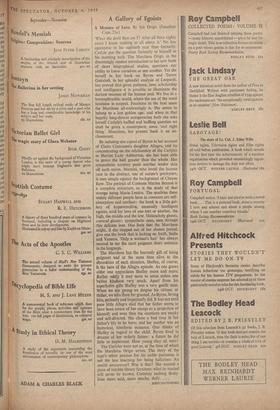A Gallery of Egoists
WitAT the devil then am I? After all these eighty years I know nothing at all about it.' No less egocentric in his eightieth year than formerly, Carlyle put the question furiously to himself in his morning bath. The Marchesa Origo, in the disarmingly modest introduction to her new book of short biographical studies, questions our ability to know ourselves or one another. Yet she herself in her book on Byron and Teresa Guiccioli, in her splendid analysis of Leopardi, has proved that given patience, love, scholarship and intelligence it is possible to illuminate the darkest recesses of the human soul. We live in a hermaphroditic world, where the use of the word feminine is suspect. Feminine in the best sense the Marchesa all-embracingly is. She seems to belong to a lost golden age; and when in that happily long-distant octogenarian bath she asks herself Carlyle's baffled and baffling question we shall be given a masterpiece, some 'real right thing.' Meantime, her present book is an en- chantment.
By isolating one aspect of Byron in her account of Claire Clairmont's daughter Allegra, and by concentrating on the relationship of the Carlyles to Harriet Lady Ashburton, she has been able to prove the half greater than the whole. Her sympathetic scrutiny peels another tender skin off each onion. Mazzini, who loved the human race in the abstract, one of nature's presbyters, is seen simply against the background of Cheyne Row. The portrait of Contessa Marina Benzon is a complete miniature, as is the study of that strange being Marie Leneru. The qualities these widely different people have in common are self- absorption and intellect: the book is a little gal- lery of hypersensitive, unusually intelligent egoists, avid for love of one sort or another, the high, the middle and the low. Melancholy ghosts, comical ghosts: sympathetic ones, seen through this delicate lens. One feels that the Marchesa might, if she stepped out of her chosen period, give one the book that is lacking on Swift, Stella and Vanessa. 'Only a woman's hair' has always seemed to me the most poignant short sentence in the language.
The Marchesa has the heavenly gift of being poignant and at the same time alive to the absurdities of each situation. Shelley, of course, Is the hero of the Allegra episode. As one grows older one appreciates Shelley more and more. Rather oddly it may seem to some unless one valdes kindness very much. Apart from his superlative gifts Shelley was a very gentle man. When we are young we despise his virtues; or father, we take them for granted. As Byron, loving him, patiently and impatiently did. It was not until poor little Allegra died that her father seems to have been aware of her except as a projection of himself; and even then the emotions are smoky and self-directed. She chose a bad time in her father's life to be born; and her mother was an hysterical, histrionic nuisance. One thinks of Shelley in regard to the child. Byron lived in dreams of her orderly future: a future he did little to implement. How young they all were!
The Carlyles were not so, at the time of which the Marchesa Origo writes. The story of the sage's white passion for his noble patroness is not the less touching for being ludicrous. An tortilla. amoureuse? Was it that? She wanted a piece of voluble library furniture; what he wanted will never be known. Certainly nothing fleshy. Jane more acid, more touchy, daily. . . .
JOHN DAVENPORT






















































 Previous page
Previous page